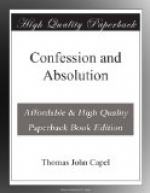It will be evident that as jurisdiction comes from God but through the Church, she can control those who are to exercise the power of pardoning sin. Hence, she insists that her priests shall carefully study the moral law, just as a lawyer does civil law. She exacts that those who hear confessions shall, by examination, prove their competency in the way of knowledge. She trains from boyhood her Levites to the sacred work they have to do, and she permits only those to be admitted to the Ministry of Reconciliation whose piety, past conduct, and judgment commend them for confessions. To those so approved she gives jurisdiction—or, as it is technically called, “faculties”—specifying where and on whom such power may be exercised. This jurisdiction is always granted for a limited period of time, during which it may be withdrawn if deemed advisable by the grantor.
Thus, then, is every care taken in the selection and in the preparation of priests for the work of hearing confessions and absolving from sin. Even after they are duly appointed, the restriction of the power to time, places, persons, and causes, together with the varied tests of competency afforded by the conferences on cases of conscience and other theological knowledge, held at frequent and regular intervals in each diocese, under the direction of the bishop, constitute a solid control over those exercising the Ministry of Reconciliation. Then the priest’s own belief and conscience, as well as the obligation to confess his sins and seek absolution for them, add to the faithful exercise of his duties as confessor.
Beyond these human precautions and considerations, the very fact that God instituted the Tribunal of Penance as the usual channel for pardoning sin, obliges us to realize that He himself would protect the administration of the sacrament. For this sacred work, His priests, during many years, are trained to a life of piety, prayer, and mortification. The spiritual education of their own souls, by meditation and examination of conscience, fits them to know the workings of the souls of others. Before undertaking the study of painfully distressing treatises on certain parts of the moral law, the Levite strengthens his soul by prayer, enters thereon simply for the glory of God and the good of souls, and is aided by experienced discreet professors.
Medical men and lawyers are not trained and selected for their profession as are priests, nor are they aided in their duties by special divine protection. Yet, relying on them as gentlemen and on their professional honor, clients, without fear or suspicion, entrust to these, themselves and their affairs.




